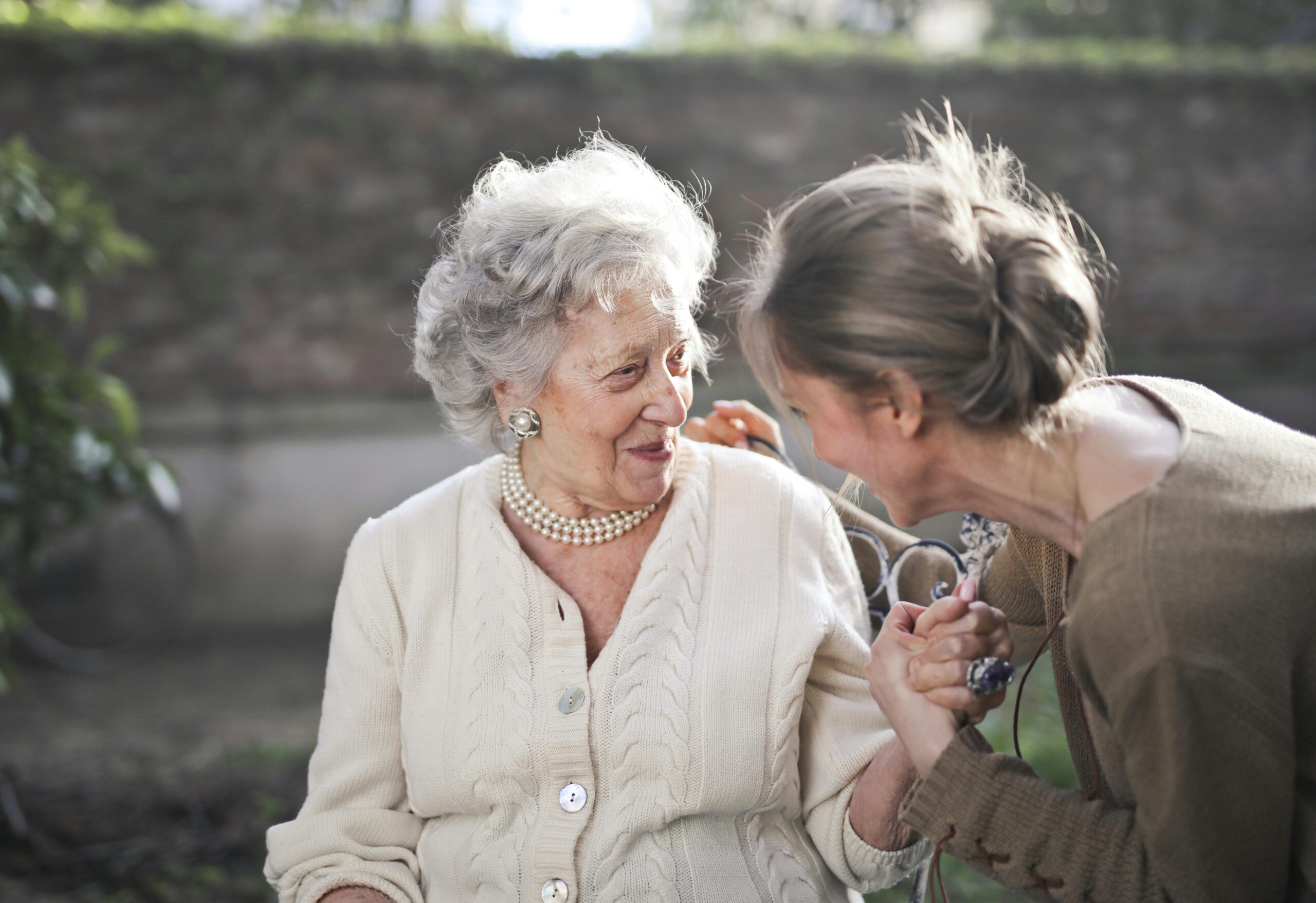At 61, She Gave Birth To Her Own Grandchild So Her Daughter -Who Couldn’t Bear A Child-could Finally Be A Mom

Most stories of childbirth follow a familiar arc—but some take a path so unexpected, so deeply human, they leave us questioning everything we thought we knew about family, sacrifice, and love.
This is one such story.
It begins with a woman in her 60s, long past the years of raising children, making a decision that would turn medical heads and tug at emotional heartstrings. At its core, it’s not just about surrogacy—it’s about grief, healing, and the extraordinary ways mothers show up when their children need them most.
What led her to carry a child that wasn’t hers, yet was hers in every meaningful way? That’s where this journey really begins.
Sara’s Dream and Struggle
From a young age, Sara Connell envisioned a life filled with the sounds of children’s laughter. She and her husband, Bill, stepped into marriage ready to build that dream together. Like many couples, they believed that parenthood would come naturally, unfolding with time and patience.
Reality dealt a different hand. After months of trying without success, Sara sought medical advice. The diagnosis was crushing—her body was not ovulating properly, making natural conception unlikely. Still, hope refused to disappear. She turned to holistic treatments like acupuncture and meditation, believing that persistence would eventually lead to the miracle she longed for.
When those efforts failed, science offered another route: in vitro fertilization. Sara and Bill embraced the treatments with cautious optimism. Their dreams seemed within reach when Sara became pregnant with twins. But heartbreak struck again. Late in the pregnancy, the twins were lost. A subsequent miscarriage deepened the wounds that grief had already carved.
Infertility is often an invisible pain, carried quietly through everyday life. For Sara, every doctor’s appointment, every test result, and every loss chipped away at her spirit. The dream of holding her own child began to slip into the background, replaced by a growing sense of isolation and despair.
Yet within that pain, something unexpected emerged. As hope seemed to fade, the bond between Sara and her mother, Kristine, grew stronger. The loss that threatened to break Sara also built a bridge between generations—a connection that would later open the door to an unimaginable possibility.
A Mother’s Unexpected Offer

After decades spent raising her family and stepping into retirement, Kristine Casey found herself searching for a deeper sense of purpose. Life had slowed down, but her heart still carried the rhythm of a mother’s love—a love that does not retire, no matter the passing of years.
During a reflective workshop, Kristine confronted a question many face later in life: What now? Not long after, she encountered a story about a postmenopausal woman who successfully carried a pregnancy. The idea seemed almost impossible, yet it planted a seed she could not ignore.
Watching her daughter endure loss after loss stirred something powerful within her. Kristine realized that perhaps her next chapter was not about personal achievement or comfort, but about helping someone else reclaim a dream thought lost.
With quiet courage, she wrote Sara a letter. In it, she gently offered what few would dare: to carry Sara’s child. Kristine acknowledged the strangeness of the idea with a touch of humor, writing, “Postmenopausal women have given birth… I’m pretty good at this.” Beneath the lightness lived a fierce determination. Her offer was not born from pity but from love—the kind of love that moves past fear, convention, and self-interest.
Sara and Bill were stunned. Questions about safety, ethics, and possibility swirled. Could a woman in her sixties safely carry a baby? Was it even fair to ask her to try?
Doubt gave way to trust. Conversations turned into consultations with doctors and counselors. Medical experts outlined the risks, but they also confirmed something remarkable: Kristine’s health made her a strong candidate. Against odds and expectation, a family found itself daring to believe again.
And so, with the quiet strength only a mother’s love can carry, Kristine prepared to embark on a journey that would defy logic but honor the deepest truths of the heart.
A Medical Marvel of Motherhood

Turning Kristine’s loving gesture into reality meant facing truths that were both inspiring and sobering. At 61 and more than ten years past menopause, Kristine’s body was in uncharted territory. Doctors had serious concerns about pregnancy at her age, warning of potential complications such as high blood pressure, diabetes, and risks to her heart.
Every precaution was taken. Kristine underwent extensive medical evaluations—heart tests, hormonal therapies, and psychological screenings—to confirm she was physically and emotionally ready. Doctors carefully balanced hope with honesty, making sure everyone involved knew the risks clearly.
But Kristine approached each challenge with unwavering determination and humor, once joking to her doctor, “Fatigue? I was more tired chasing toddlers years ago. I’m retired now—I think I can handle this.” Her spirit reassured her family, even as fears lingered.
Emotionally, the journey was equally complex. Sara watched her mother endure discomfort, anxiety, and medical appointments, knowing each moment was an expression of unconditional love. Together, they navigated unfamiliar territory—mother and daughter roles shifting, deepening their connection.
The first round of IVF failed, yet they persisted. On their second try, an embryo—created from Sara’s egg and Bill’s sperm—successfully implanted. Hope surged, tempered by cautious optimism. Each ultrasound became a small victory, every heartbeat confirmation of a miracle unfolding.
Kristine’s pregnancy progressed smoothly, surprising doctors and delighting the family. But beneath the excitement remained an awareness of the extraordinary circumstances, grounding them in gratitude and humility.
In these challenging months, the family learned profound lessons: medical science can open doors, but it is human courage and love that truly carry people through.
The Birth of a Miracle

On a cold February evening at Prentice Women’s Hospital in Chicago, years of hope, heartbreak, and perseverance came to a head. Kristine Casey, steady and calm, was wheeled into the operating room, her daughter Sara by her side, their hands clasped tightly.
At 9:47 p.m., the cry of a newborn filled the air. Finnean Lee Connell had arrived—a healthy baby boy, carrying with him the weight of dreams fulfilled and prayers answered. In that room, even seasoned medical professionals found themselves overcome with emotion. Dr. Susan Gerber, who delivered Finnean, later reflected, “There wasn’t a dry eye in the room.”
For Sara, hearing her son’s first cry was a moment suspended in time. Years of silent suffering broke open into overwhelming joy. Watching her mother, the woman who had carried not just her through life, but now her son as well, filled her with awe and gratitude beyond words.
Kristine, lying in recovery, felt a different kind of fulfillment. Having given birth decades earlier to her daughters, this experience was both familiar and brand new. She had not carried this child to expand her own family, but to restore her daughter’s dream of motherhood. Her body bore the marks of sacrifice, but her spirit was light with peace.
Finnean’s birth was not simply a medical achievement. It was a living testament to the power of love, resilience, and the courage to step into the unknown when someone else’s happiness depends on it.
As Sara held her son for the first time, with her mother looking on, three generations were united—not just by blood, but by a bond that had been tested, deepened, and ultimately strengthened through an extraordinary journey.
How Science Lets Love Redefine Generations

Kristine and Sara’s story is extraordinary, but it’s not entirely unique. Family-based surrogacy—a mother carrying her daughter’s child—is becoming more common as medical advancements open doors previously thought closed.
Consider Linda Sirois from Maine, who at 49 carried her own grandson after doctors advised her daughter against pregnancy due to health risks. Or Jaci Dalenberg, a 56-year-old woman from Ohio who delivered triplets for her daughter after a hysterectomy made pregnancy impossible. Each story holds its own complexities, yet shares one powerful similarity: mothers choosing love and sacrifice above age or convention.
Still, family surrogacy sparks conversations and debates. Some question whether these pregnancies blur family roles or create emotional confusion. Ethical discussions also arise about consent and autonomy—whether older women genuinely feel free to decline such emotionally charged requests. These questions deserve attention, highlighting the delicate balance families must maintain when embarking on such journeys.
Medical experts echo this caution, emphasizing that successful pregnancies at advanced ages, like Kristine’s, remain exceptions rather than norms. Each case requires thorough evaluation and preparation. Yet, despite these cautions, the families involved frequently express profound gratitude and fulfillment, emphasizing the emotional rewards over medical uncertainties.
At its core, this growing trend teaches an essential truth: Family is defined less by traditional boundaries and more by the courage to stand with each other through life’s greatest challenges. When love pushes beyond convention, families transform, revealing the deeper possibilities of human connection.
Lessons for Life from an Extraordinary Journey

Sara and Kristine’s story isn’t just a medical marvel. It’s a powerful reminder that family is not a rigid concept—it’s a living, breathing entity defined by love, sacrifice, and the willingness to show up for one another when it matters most. This journey, fraught with pain, uncertainty, and courage, offers valuable lessons that extend beyond the world of infertility and surrogacy.
1. Family Isn’t Defined by Traditional Roles
We often limit our understanding of family to a narrow, traditional framework. But family isn’t just about biological connections—it’s about the bonds we create through love, support, and shared experiences. Kristine’s act of carrying her daughter’s child redefines what it means to be a mother, a daughter, and a grandmother, showing us that family can take on many shapes.
2. Grief Can Lead to New Beginnings
For Sara, each loss was a wound that ran deep. But rather than closing her off, grief became the catalyst for growth. It was through her pain that a new chapter was written—one that she could never have imagined. Sometimes, what feels like the end is actually the beginning of something more profound.
3. Purpose Can Be Found at Any Age
Kristine’s journey began after retirement, when many believe their most meaningful chapters are behind them. Yet, her story proves that purpose can find us at any age. Whether it’s helping a loved one, pursuing a new dream, or overcoming personal limitations, life can still offer profound meaning in unexpected ways.
4. Love Isn’t Always Easy, But It’s Always Worth It
Love asks us to give, to sacrifice, and to take risks—sometimes in ways we never imagined. But there’s no limit to what love can do when we are willing to step beyond our comfort zones. Kristine’s decision to carry Finnean wasn’t just a medical feat; it was a profound expression of love, a love that overcame doubts, challenges, and fears for the sake of another.
5. We Don’t Have to Go It Alone
Sara and Kristine’s journey wasn’t a solo venture. Behind them stood a network of medical professionals, legal advisors, and family members who offered guidance, support, and encouragement. Whether we face infertility, loss, or any other challenge, the key is to build a team that shares our vision and helps carry us through.
In a world that often celebrates individual achievement, the Connell family’s story highlights a simple but profound truth: when we show up for each other with love, courage, and an open heart, we can achieve miracles together. They remind us that family is not bound by biology—it is bound by the love we are willing to give, no matter the cost.
Featured Image Source: Pexels
Loading...






